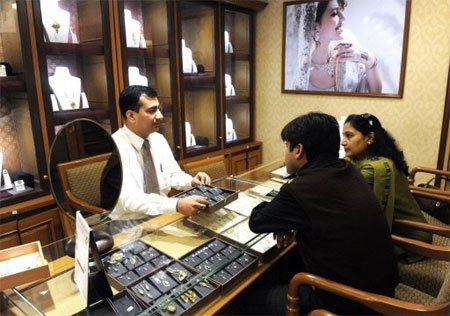AFP
14 дек. 2009 г.
India's gold retailers jump on the 'brandwagon'
AFP
14 дек. 2009 г.
NEW DELHI, Dec 14, 2009 (AFP) - Indians, the world's biggest buyers of gold, are increasingly opting for branded jewellery, attracting franchisers and foreign groups like Cartier at the expense of traditional retailers.
 Photo: AFP |
Traditionally, most Indians would go to their small family jewellers, normally located in a congested wholesale market, sit down on cotton mattresses with the jeweller and pick out some items.
The process worked on trust built up in some cases over generations between buyer and jeweller, who would mostly offer products from artisanal designers and producers from his area.
Nowadays, young Indians are opting for brightly lit showrooms with marble floors, glass display cases and professional salespeople -- preferably at a company whose brand name implies social status and wealth.
"There is a tectonic shift in the business now. If you want your gold jewellery business to survive -- brand it and advertise," said Sandeep Kulhali, vice president of Tanisq, one of India's oldest branded retail jewellery chains, owned by the Tata conglomerate.
Tanisq opened their first outlet in 1994 and now have 117 showrooms across the country.
"Earlier it was difficult to convince consumers to buy branded gold," said Kulhali.
"These days they come to us expecting better services, premium quality, exchange policy and attractive offers -- like buying jewellery on a monthly installment basis," he added.
Amit Bumb, director of Avenue Montaigne, India's largest branded jewellery retail outlet, suggests the shift towards brands reflects social changes, but also new ways of viewing gold.
The precious metal is traditionally given to brides at the time of marriage as a store of wealth providing financial security.
"There is a shift in consumer tastes: working women in the 20 to 32 age group regard jewellery as an accessory and not just as an investment," Bumb told AFP. "It is in this market that the brand names work."
Some of the most famous companies in Western jewellery such as DeBeers, Tiffany and Cartier have also moved into India since 1997 when overseas banks and bullion suppliers were allowed to import gold.
They are drawn by the enormous size of the market, rising incomes and the fracturing relationship between buyers and traditional family jewellers.
According to the International Monetary Fund, about 15,000 tonnes of gold are privately held in India. Demand remains strong despite new records being set for the price of the metal on an almost daily basis.
Premium international brand Cartier launched their plush showroom in New Delhi in 2008 and also operate through a strong dealer network to sell their jewellery and watches in India.
"We are happy with the response from buyers in India," said a saleswoman at the Cartier store in Delhi, who said customers were drawn to the fact the high-end brand stood out from its Indian competitors.
A study released by the Bullion Association of India in March 2009 stated that the share of branded jewellery in the total market was growing at a pace of 20-30 percent annually.
The number of gold retailers in the country has increased by 40 percent since the year 2000, with 150 domestic and over 65 international established brands, the study said.
Faced with the changing dynamics, traditional jewellers are looking to jump on the "brandwagon" by investing in advertising and trying to build a presence in the minds of consumers.
Traditional jewellers like Notandas & Sons in the western city of Mumbai and P.C. Jewellers in New Delhi have signed up Bollywood heroines as brand ambassadors and also lend their products to contestants in beauty pageants.
"I am branding my entire business to save it," said Ritesh Jain, who inherited a family bullion trading and retailing business started by his grandfather in Mumbai.
Jain has revamped everything under the brand name "Auro Gold."
"We are now a professionally managed, transparent gold retail and wholesale company," he said.
Jain says he has spent over 300,000 dollars to renovate the shop's showroom, train the staff, and create an image that retains a sense of familiarity for the old loyal customers and attracts new buyers.
"We have an advantage -- we enjoy the trust factor, people know us. Now they just have to accept our new professional image," he said.
Gold analyst Ravi Choksi says that as the industry professionalises the smaller brands will face a tough challenge from the retail arms of conglomerates like Tata and Reliance.
Reliance has opened 14 jewellery stores in 13 Indian cities since 2007 and says it will launch showrooms in various other cities and towns across the country.
"They have solid backing and resources to run the business from the parent company," he said, adding that some brands will have to find niches while others might have to move out of the saturated urban centres to rural markets.by Rupam Jain Nair
Копирайт © 2024 AFP. Все права защищены. Любая информация даннного раздела защищена законом об интелектуальной собственности и не может быть скопирована, перепечатана, изменена, издана или использована в коммерческих целях.

























